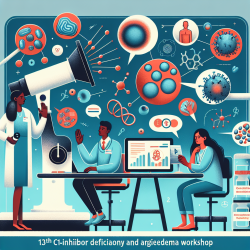The 13th C1-Inhibitor Deficiency and Angioedema Workshop—2023, held in Budapest, brought together nearly 400 participants from 50 countries to discuss the latest research and developments in the field of Hereditary Angioedema (HAE) and C1-inhibitor deficiency. The workshop, chaired by Professor Henriette Farkas, featured presentations from 93 speakers across 10 oral and 2 poster sessions. This blog aims to highlight key findings from the workshop and suggest ways practitioners can implement these insights to improve patient outcomes.
Genetic Approaches to Therapy
One of the most promising areas discussed at the workshop was the advent of genetic therapies for HAE. CRISPR technology has shown significant potential, particularly in the knockout of the prekallikrein (PK) gene. Preliminary results indicate that many participants were attack-free at 16 weeks with a 92% reduction in PK levels. This suggests that CRISPR could be a game-changer in managing HAE, offering a more permanent solution compared to traditional therapies.
Another innovative approach involves the adenovirus-dependent insertion of C1 INH into hepatocytes. This method has achieved C1 INH synthesis and secretion into the plasma, although the duration of effect is still under investigation. These genetic approaches not only provide new avenues for treatment but also emphasize the importance of personalized medicine in managing HAE.
Novel Therapeutics
Several new therapies employing proteins or peptides were highlighted. For instance, a new monoclonal antibody directed to factor XIIa showed excellent efficacy, with 56% of study patients being attack-free. Additionally, Berotralstat and sebetralstat have proven effective for prophylaxis, even in adolescents. Sebetralstat, in particular, can be used for short-term prophylaxis, making it ideal for surgical or dental procedures.
Another noteworthy development is an oral B-2 receptor antagonist with a long half-life of 10 hours. In a phase 2, dose-ranging study, this agent successfully treated HAE attacks, offering a convenient and effective oral option for patients.
Quality of Life and Patient Compliance
Quality of life (QOL) improvements were noted with the use of subcutaneous (SC) C1 INH or Lanadelumab. However, issues such as drug availability, costs, and appropriate use of medications remain challenges. The unpredictability of HAE attacks contributes significantly to patient anxiety, emphasizing the need for reliable, on-demand therapies.
Interestingly, the workshop highlighted that some patients do not carry their “on-demand” therapy when traveling, preferring treatment at home or finding it inconvenient. This underscores the need for patient education and support to ensure they are always prepared to manage an attack.
Research and Future Directions
The workshop also covered basic studies, such as the role of mutated plasminogen or plasmin in bypassing factor XII and prekallikrein in HAE. These studies provide a deeper understanding of the disease's pathogenesis and could lead to the development of new therapeutic targets.
Artificial intelligence (AI) was another exciting topic, particularly its role in the assisted diagnosis of angioedema. Ongoing updates to the International Consensus Document regarding the role of genetics in HAE diagnosis and management were also discussed, highlighting the dynamic nature of this field.
Implementing Workshop Insights in Clinical Practice
Practitioners can leverage these insights by:
- Staying updated on genetic therapies and considering them for eligible patients.
- Exploring new therapeutic options like monoclonal antibodies and oral agents for both long-term and short-term prophylaxis.
- Focusing on improving patient QOL by addressing issues related to drug availability, costs, and compliance.
- Utilizing AI and updated consensus documents to enhance diagnostic accuracy and treatment planning.
By integrating these findings into clinical practice, practitioners can significantly improve outcomes for patients with HAE and C1-inhibitor deficiency.
To read the original research paper, please follow this link: 13th C1-inhibitor deficiency and angioedema workshop—2023










